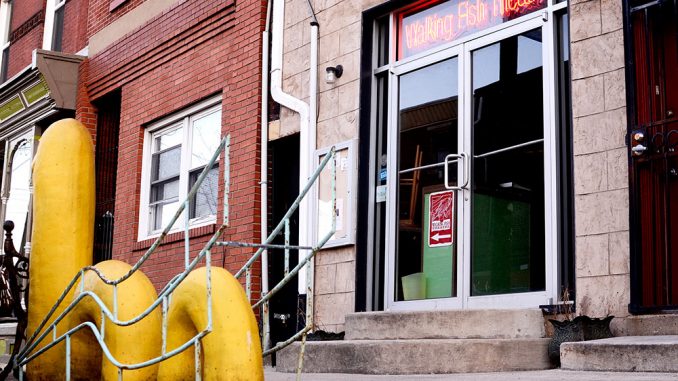
Michelle Pauls and her husband Stan Heleva, founders of the Walking Fish Theatre, were artists renting an apartment in Northern Liberties for 10 years, but when it came time to buy a house and raise a family, they couldn’t afford the neighborhood.
“Kensington is more affordable for artists,” Pauls said. “We decided that if we were to continue to do theater, we wanted to have our own place where we could have more control over the production of it. We found the building at 2509 Frankford Ave. and saw how we could make an impact on our community.”
Since opening Walking Fish Theatre a little more than seven years ago, the company has produced four main stage shows annually, as well as countless co-productions with other local arts groups, provided classes and workshops, produced standup comedy shows, burlesque and family theater and has earned a reputation for supporting Philly-based art.
Evident in its tendency to promote and hire local playwrights, actors and young artists, Pauls said Walking Fish believes that making art and theater readily available in a community is essential.
“When people experience art and take part in it, they see the parameters of their world expand,” Pauls said.
Walking Fish recently supported LabFest, an initiative with the Philadelphia Dramatist Center. The program combined the playwrights of the PDC and the mechanisms to produce from the Walking Fish.
Pauls said she and her husband read more than 30 plays and then worked on three of them with their directors to develop them.
“I’ve never written a play in such a short amount of time,” said Brian Grace-Duff, one of the chosen playwrights. “I got to walk into a room full of actors that weren’t scared with an entirely new draft every single rehearsal and that was amazing. I was fortunate enough to get chosen.”
The initiative was to support playwrights in a space that was both constructive and encouraging.
“I hope more writers can participate in programs like that and opportunities like that continue,” Grace-Duff said. “But that’s always the question: Is this program going to survive next year? And that is always the hope.”
As a member of the PDC, Grace-Duff said it’s interesting to be a part of so many small organizations and theaters, but still feel like Philadelphia provides an open environment for art.
“It’s not like having a clique in high school,” he said. “There is a lot more freedom to move around, while still having your little family.”
Many of Grace-Duff’s opportunities, such as his participation with the Walking Fish Theatre and the PDC, came from connections through friends and creating relationships with professional playwrights.
“You can make pretty deep connections with people here,” he said. “There are always new companies bubbling up and they are always evolving. I can’t imagine something like that happening in New York. I’ve literally just met influential people through friends. The Philly Fringe is one of those things that is amazing for that.”
Getting members of the community involved in local theater seems to be showing a change in the communities as well. Grace-Duff described Philly artists as being interested in Philadelphia, which eventually reflects onto their work onstage and in the community.
“I’m starting to see people that want to do work just because their neighbors working are right there,” Grace-Duff said. “There is that idea of community, and an extension of that is wanting to tell the stories of those communities. I don’t know how exactly, but some artists are changing the area in a more visible way, like simply taking a residence in a neighborhood. The changes are right there and right on the cusp for a lot of us.”
The Applied Mechanics, another local ensemble of artists, share a meal at every rehearsal as part of its desire to build friendships within its casts and the neighborhood, said member Thomas Choinacky. The meals started as a way to pay artists, as the company had limited resources and money to compensate actors during its early projects.
This communion was especially impactful during its 2012-13 show “Vainglorious,” which had a cast of 26 performers.
“Bringing that many artists into a room and having time for us all to sit down together to eat a home-cooked meal, within creating an epic show, allowed the project to flourish,” Choinacky said.
From the success that came from sharing meals during “Vainglorious,” Choinacky said it prompted the group to start sharing meals with the community as well.
“We care about the community we live in and the artists who are in it,” he said. “By promoting time that local artists can convene to catch up and share a delicious meal together strengthens our relationships and artist community.”
Many opportunities seem to be growing outside of the most popular and financially dependent theater companies in Center City, and starting from the ground up in communities in other parts of Philadelphia, such as Fishtown.
“Seeing opportunities push further from Center City is really cool,” Grace-Duff said. “Going out there and finding some new theater is really great.”
Grace-Duff said the unique goal of theater in Philadelphia is to always see how it can help or reflect back onto the community.
“A lot of it is, can we point the work outwards? Can we point it to the community itself?” he said. “The growth is about supporting and nurturing the Philadelphia artist. That’s really important, and there is really a lot of fruit in that.”
Emily Rolen can be reached at emily.rolen@temple.edu.


Be the first to comment